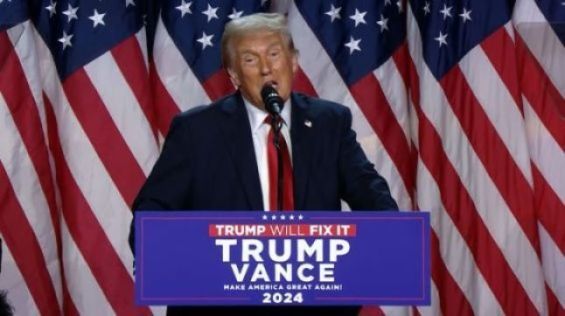Republican candidate Donald Trump announced his victory in yesterday's U.S. presidential election, declaring in a speech from his campaign headquarters in Florida.
With this win, Americans have re-elected the former president (2017-2021) for a second term—marking the first time since 1892 that a president has returned after losing an election, as Trump had in 2020 to Democratic candidate Joe Biden.
World leaders began to congratulate Trump, with French President Emmanuel Macron writing on X, «Ready to work together as we did for four years. With your convictions and mine. With respect and ambition. For more peace and prosperity». Israeli Prime Minister Benjamin Netanyahu also congratulated Trump, tweeting, «Congratulations on history’s greatest comeback!» He added, «Your historic return to the White House offers a new beginning for America and a powerful recommitment to the great alliance between Israel and America».
Other leaders, including the British and Spanish prime ministers, the German Foreign Ministry, the Turkish President, the President of the European Commission, and the NATO Secretary-General, also extended their congratulations to Trump.
Opinions around the world vary regarding Trump’s return, given the stark differences between his positions and those of his Democratic rival, Kamala Harris, on various international issues and conflicts.
What about Morocco ?
Morocco views Trump’s return to the White House with some optimism. At the end of his previous term, the United States recognized Moroccan sovereignty over the Sahara as part of a trilateral agreement involving Rabat, Tel Aviv, and Washington.
After Trump’s departure, the Biden administration took a more cautious approach to the Sahara issue, upholding the recognition of Moroccan sovereignty but without fully implementing the trilateral agreement. Instead, the administration reiterated traditional U.S. support for UN efforts to resolve the conflict, viewing Morocco’s autonomy plan as serious and credible.
The trilateral declaration signed under the Trump administration stated that The United States recognizes Moroccan sovereignty over the entire territory of Western Sahara and supports the serious, realistic, and credible Moroccan autonomy plan as the only basis for a just and lasting solution to the dispute over the Western Sahara region.
The U.S. also encouraged economic and social development in the Western Sahara region, pledging to open a consulate in Dakhla to promote economic and investment opportunities there. With Trump back in office, Morocco hopes he will fulfill this commitment, especially the opening of the Dakhla consulate, which would solidify U.S. recognition on the ground, in line with the declaration’s commitment to fully respect, promote, and defend the elements contained in this declaration.
Trump’s presidential decree affirming Moroccan sovereignty over the Sahara concluded that «the United States believes that an independent Sahrawi state is not a realistic option for resolving the conflict, and that genuine autonomy under Moroccan sovereignty is the only possible solution». This decision marked a pivotal shift in the Sahara issue, encouraging other countries, including France, to recognize Morocco’s claim.
Furthermore, Morocco anticipates that a new Trump administration would be more cooperative regarding military agreements. In Trump’s first term, the U.S. approved a $1 billion arms package for Morocco—including Hellfire missiles, Paveway bombs, JDAM kits, and four MQ-9PC Guardian drones—but the Biden administration has not yet acted on this deal.





 chargement...
chargement...













